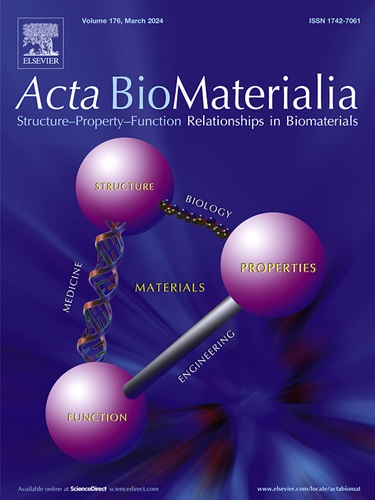Oral delivery of ultra-small zwitterionic nanoparticles to overcome mucus and epithelial barriers for macrophage modulation and colitis therapy
IF 9.4
1区 医学
Q1 ENGINEERING, BIOMEDICAL
引用次数: 0
Abstract
Ulcerative colitis (UC) is a chronic inflammatory disease of the colon that poses significant therapeutic challenges due to the intestinal mucus and epithelial barriers. In this study, ultra-small zwitterionic nanoparticles (HC-CB NPs) is developed based on glutathione (GSH)-responsive hyperbranched polycarbonate to enhance the oral delivery of drugs and overcome these physiological barriers. HC-CB NPs demonstrate high colloidal stability across a wide range of pH environments and physiological fluids, preventing premature drug release within the gastrointestinal tract. The ultra-small sized HC-CB NPs demonstrate minimal mucin adsorption and effectively penetrate through the mucus layer, and the zwitterion surface further facilitate epithelial barrier crossing via the proton-assisted amino acid transporter 1 (PAT1) pathway. HC-CB NPs mediate enhanced macrophage uptake via monocarboxylate transporters (MCTs) pathway and ultimately improved therapy efficacy on colitis. The in vivo results reveal that FK506-loaded HC-CB NPs (HC-CB NPs@FK506) significantly reduce inflammatory markers (TNF-α, IL-6) and myeloperoxidase (MPO) levels, while promoting epithelial integrity by increasing E-cadherin expression. This study offers a promising approach to overcoming intestinal barriers in oral UC treatment, offering biocompatibility and potential for clinical translation.
Statement of significance
Ulcerative colitis (UC) is a chronic inflammatory disease of the colon that poses significant therapeutic challenges due to the intestinal mucus and epithelial barriers. This study explores an oral UC therapy using ultra-small zwitterionic nanoparticles (HC-CB NPs) constructed from GSH-responsive hyperbranched polycarbonate. Compared to existing strategies, HC-CB NPs demonstrate minimal mucin adsorption and effectively penetrate through the mucus layer, and the zwitterion surface further facilitate epithelial barrier crossing via the proton-assisted amino acid transporter 1 (PAT1) pathway. Additionally, HC-CB NPs mediate enhanced macrophage uptake via monocarboxylate transporters (MCTs) pathway, resulting in improved therapeutic efficacy. These findings underscore the potential of HC-CB NPs as a transformative platform for overcoming intestinal barriers in UC treatment.

求助全文
约1分钟内获得全文
求助全文
来源期刊

Acta Biomaterialia
工程技术-材料科学:生物材料
CiteScore
16.80
自引率
3.10%
发文量
776
审稿时长
30 days
期刊介绍:
Acta Biomaterialia is a monthly peer-reviewed scientific journal published by Elsevier. The journal was established in January 2005. The editor-in-chief is W.R. Wagner (University of Pittsburgh). The journal covers research in biomaterials science, including the interrelationship of biomaterial structure and function from macroscale to nanoscale. Topical coverage includes biomedical and biocompatible materials.
 求助内容:
求助内容: 应助结果提醒方式:
应助结果提醒方式:


